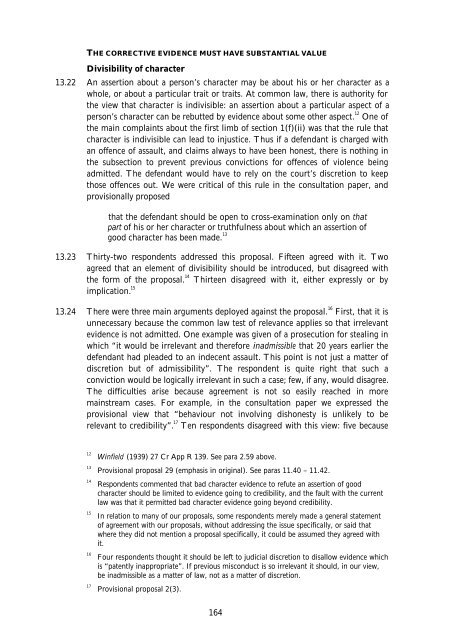Evidence of Bad Character in Criminal ... - Law Commission
Evidence of Bad Character in Criminal ... - Law Commission
Evidence of Bad Character in Criminal ... - Law Commission
Create successful ePaper yourself
Turn your PDF publications into a flip-book with our unique Google optimized e-Paper software.
THE CORRECTIVE EVIDENCE MUST HAVE SUBSTANTIAL VALUE<br />
Divisibility <strong>of</strong> character<br />
13.22 An assertion about a person’s character may be about his or her character as a<br />
whole, or about a particular trait or traits. At common law, there is authority for<br />
the view that character is <strong>in</strong>divisible: an assertion about a particular aspect <strong>of</strong> a<br />
person’s character can be rebutted by evidence about some other aspect. 12 One <strong>of</strong><br />
the ma<strong>in</strong> compla<strong>in</strong>ts about the first limb <strong>of</strong> section 1(f)(ii) was that the rule that<br />
character is <strong>in</strong>divisible can lead to <strong>in</strong>justice. Thus if a defendant is charged with<br />
an <strong>of</strong>fence <strong>of</strong> assault, and claims always to have been honest, there is noth<strong>in</strong>g <strong>in</strong><br />
the subsection to prevent previous convictions for <strong>of</strong>fences <strong>of</strong> violence be<strong>in</strong>g<br />
admitted. The defendant would have to rely on the court’s discretion to keep<br />
those <strong>of</strong>fences out. We were critical <strong>of</strong> this rule <strong>in</strong> the consultation paper, and<br />
provisionally proposed<br />
that the defendant should be open to cross-exam<strong>in</strong>ation only on that<br />
part <strong>of</strong> his or her character or truthfulness about which an assertion <strong>of</strong><br />
good character has been made. 13<br />
13.23 Thirty-two respondents addressed this proposal. Fifteen agreed with it. Two<br />
agreed that an element <strong>of</strong> divisibility should be <strong>in</strong>troduced, but disagreed with<br />
the form <strong>of</strong> the proposal. 14 Thirteen disagreed with it, either expressly or by<br />
implication. 15<br />
13.24 There were three ma<strong>in</strong> arguments deployed aga<strong>in</strong>st the proposal. 16 First, that it is<br />
unnecessary because the common law test <strong>of</strong> relevance applies so that irrelevant<br />
evidence is not admitted. One example was given <strong>of</strong> a prosecution for steal<strong>in</strong>g <strong>in</strong><br />
which “it would be irrelevant and therefore <strong>in</strong>admissible that 20 years earlier the<br />
defendant had pleaded to an <strong>in</strong>decent assault. This po<strong>in</strong>t is not just a matter <strong>of</strong><br />
discretion but <strong>of</strong> admissibility”. The respondent is quite right that such a<br />
conviction would be logically irrelevant <strong>in</strong> such a case; few, if any, would disagree.<br />
The difficulties arise because agreement is not so easily reached <strong>in</strong> more<br />
ma<strong>in</strong>stream cases. For example, <strong>in</strong> the consultation paper we expressed the<br />
provisional view that “behaviour not <strong>in</strong>volv<strong>in</strong>g dishonesty is unlikely to be<br />
relevant to credibility”. 17 Ten respondents disagreed with this view: five because<br />
12 W<strong>in</strong>field (1939) 27 Cr App R 139. See para 2.59 above.<br />
13 Provisional proposal 29 (emphasis <strong>in</strong> orig<strong>in</strong>al). See paras 11.40 – 11.42.<br />
14 Respondents commented that bad character evidence to refute an assertion <strong>of</strong> good<br />
character should be limited to evidence go<strong>in</strong>g to credibility, and the fault with the current<br />
law was that it permitted bad character evidence go<strong>in</strong>g beyond credibility.<br />
15 In relation to many <strong>of</strong> our proposals, some respondents merely made a general statement<br />
<strong>of</strong> agreement with our proposals, without address<strong>in</strong>g the issue specifically, or said that<br />
where they did not mention a proposal specifically, it could be assumed they agreed with<br />
it.<br />
16 Four respondents thought it should be left to judicial discretion to disallow evidence which<br />
is “patently <strong>in</strong>appropriate”. If previous misconduct is so irrelevant it should, <strong>in</strong> our view,<br />
be <strong>in</strong>admissible as a matter <strong>of</strong> law, not as a matter <strong>of</strong> discretion.<br />
17 Provisional proposal 2(3).<br />
164

















